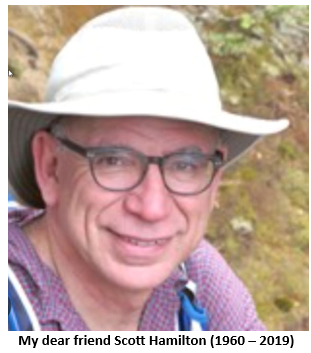
The year was 2016. Scott Hamilton was only 55 years old, living in Boston, and working a full-time job as an IT project manager when he noticed something odd. On a camping trip, his right hand felt very cold, and he could not get a grip on the zipper of his tent.
Nine months later, he would learn that he was showing the first symptoms of Amyotrophic Lateral Sclerosis (ALS), better known as Lou Gehrig’s Disease. ALS is a progressive neurodegenerative disease that affects the motor neurons in the brain and spinal cord. There is no known cure. Life expectancy is three to five years from diagnosis. In Scott’s remaining time, Scott’s world was going to get progressively smaller and his life increasingly difficult and painful.
Scott decided to take the reins on his life and live it as fully as he could in his time left. He retired, expanded his involvement as a volunteer for Big Brothers / Big Sisters, and began coaching men struggling with relationships or going through divorce. He began singing in a second local chorale. But most of all, he loved traveling and visiting with friends.
That’s how my path crossed Scott’s. My wife and I were on vacation in February 2017, enjoying a warm breeze on sunny Siesta Key beach near Sarasota, Florida. We had just sat down at a picnic table for lunch. Across from us was a man typing away on his laptop. I asked him what he was working on. Scott looked up and cheerfully said, “I am updating my journal about my travels.”
I told him I too was a writer, of sorts. We struck up a conversation that, to my surprise, would lead to a powerful, close, albeit sadly far too brief friendship. I learned that he had two grown children, David and Lauren, and a longtime partner named Rachel, who he loved deeply. I learned that he loved skiing, tennis, visiting national parks, and spending time with his large universe of friends scattered across the country.
Then Scott shared, in a very matter-of-fact manner, that he had been diagnosed with ALS nine months prior, and was given a life expectancy of three to five years, although he said he was still feeling, for the most part, quite well. He had no idea how much longer he had. He was just beginning to show signs of his physical decline. His right arm, right hand, and to a lesser extent, right leg were starting to lose muscle strength and beginning to atrophy. It was just a matter of time before he would lose all ability to move the right side of his body, before it progressed to his left side, and then ultimately move on to his vital organs.
ALS is a cruel disease. But as Scott talked about the daunting road ahead, there was not the slightest hint of self-pity, anger, or denial. Amazingly, he seemed to have accepted his fate. He decided he was going to do everything he could on his bucket list while he was still physically able to. He radiated a positivity that you rarely see in someone grappling with such grim prospects for the future.
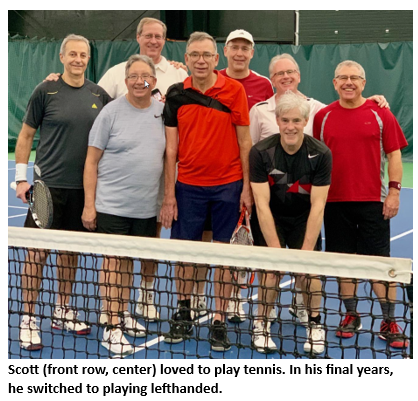
Six months later, Scott arrived at my doorstep. He had bought a van he’d outfitted for camping. Scott’s health was already showing signs of decline. But his spirit was relentlessly positive. I remember a long walk we took during his visit. My wife and I were deeply anxious about the mental wellness of one of our daughters, then twenty-two. Scott became completely focused on trying to help me find a way to connect with my daughter. It was like we’d been friends my entire life. His entire focus was on me and my worries, not at all about his own.
Between 2016 and 2018 Scott traveled the country visiting friends. He experienced the rare opportunity to travel with his choir to South Africa to perform. He skied for as long as his legs would carry him, wrapping his non-functioning right arm to his chest, and using a single pole. He went to places he’d never seen before and continued to meet new friends along the way.
Scott loved to play tennis, but being right-handed, by now, this was not an option because his right side had deteriorated badly since the time we’d met earlier that year. Even his left hand was starting to weaken. So, he somehow strapped the tennis racquet to his left arm, and we played a few games of tennis. He struggled mightily but never complained. When we were done, Scott calmly stated, “I think it’s time I said goodbye to tennis.”
We spoke by phone a few times after that, and the following summer (2018) Scott came to visit again. Being from Boston, Scott was a big baseball fan. We went to a Mariners game. In the year that had passed since our previous visit, Scott’s mobility had noticeably declined. His speech was slower and somewhat slurred. But his mind was as sharp as ever. Scott would talk about the things he had had to give up, but never complaining or attempting to burden the person he was talking with. It was all so matter of fact. I have never seen anyone model “acceptance” more stoically than Scott.
When Scott no longer had the balance to manage a two-wheeled bike, he began riding a recombinant three wheeler. But one day he simply shared, “I had my last ride on my tricycle. It’s too hard to get into anymore, so I will find it a new home.”
By mid-2019, Scott was no longer able to ski, ride a bike, or even drive. He became mostly confined to a wheelchair. With each new barrier to his mobility and quality of life, he confronted it gracefully, calmly, and with a quiet acceptance. When I would ask him how he was feeling, he would never shy away from discussing the struggles he was enduring. He was always transparent about his ordeal. But his focus was more about how grateful he was to have lived the life he had, and to have been surrounded by so many people that he loved and who loved him.
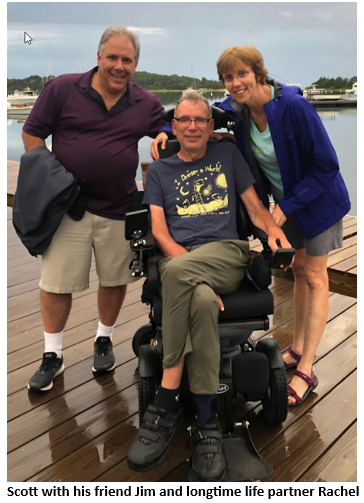
In November 2019, when Rachel wrote to me to share that Scott had passed peacefully in his sleep, I felt like I had lost a lifelong friend.
Scott was a man I deeply admired, for his courage, his grace, his kindness, and his desire to make a positive and lasting impact on the lives of the people he touched. I will forever be grateful for that chance encounter at a picnic table on Siesta Key and the introduction it gave me to one of the finest and most decent men I have ever known. A man who truly lived his life to the fullest.
[Postscript: A few weeks before Scott’s passing, a friend of his created this video of Scott and some of the places he traveled and people he visited while he still had his health. If you are curious, you can watch it here.]
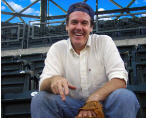
Subscribe to my View from the Bleachers YouTube Channel and request notifications to see my latest videos. And check out my latest book, THE SECRET TO SUCCESS AND HAPPINESS (is Something I Have Never Figured Out. I’ Open to Suggestions)




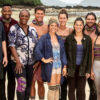






Scott showed how to gracefully accept the things we couldn’t change and to make the most of what we could do. We were fortunate to have known him!
Thank you, Tim, for sharing Scott’s story. It is powerful and inspiring. It reminds me of a verse from Hebrews. “Do not forget to entertain strangers, for by so doing some people have entertained angels without knowing it.”
I feel like I got to know you Scott through Tim. On your plane of existence will you send to our earth plane your patience, acceptance and Grace. May peace be upon you. Linda
This “View from the Bleachers” hits a triple: Scott’s astounding bravery, Tim’s recognition of that bravery, and his lovely sensitive writing about it. Thanks for a great story, perfectly written.
This is an inspirational account of a man who can be a model for us . His strength and courage and acceptance of his increasing limitations seem to be almost legendary.. Thank you Tim, for sharing this story.
Alice B.
What a beautiful tribute to a very special person.
I really enjoyed reading this. Thank you for sharing this touching story.
Live each day to the fullest… and that’s what he did – to the end.
Scott Hamilton sounds like he was a brave and powerful man even though he’d probably not describe himself that way.
Thanks for sharing this very powerful story, Tim.